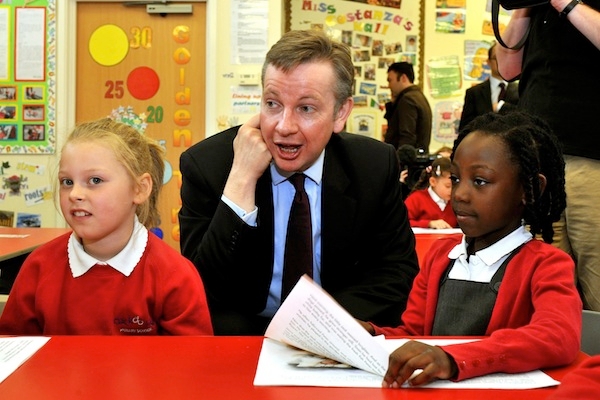Education reform that actually works is one of the noblest, but most thankless, tasks in politics. Noble because it’s necessary, thankless because it doesn’t earn much in the way of an electoral dividend. Polling consistently suggests fewer than 15% of people consider education a top priority.
This is understandable. If you do not have children you are, often, less interested in education than if you do. If your children attend a good school (or, at least, if you are satisfied with the school they attend) you may not care too much about the schools other kids have to attend.
Moreover, since education reform necessarily means telling the educational establishment it has not been doing well enough (despite much excellence, hard work, etc etc) it is a cause guaranteed to make enemies and, worse, hurt people’s feelings.
So it is interesting to read John Rentoul reporting today that Lib Dem research indicates that attacking Michael Gove may be one of the most effective ways for Nick Clegg’s party to appeal to public sector workers who voted Lib Dem in 2010 but are currently disinclined to support the Lib Dems at the next election. It’s not what a proper liberal party would do but, hey, whatever works.
Coincidentally, Richard Garner has a small article in today’s Independent on the fate of Downhills Primary, the Haringey school Michael Gove “forced” to become an Academy in a “bitter” battle last year. Garner writes:
Needless to say, the battle was lost and it was taken over by the Harris Federation and changed its name to the Harris Primary Academy Philip Lane.
Last week’s results indicate a major turnaround: it has more than doubled the number of pupils passing the Government’s new phonics test check for six-year-olds from 36 per cent to 75 per cent. In the results for 11-year-olds, those reaching the required reading standard are up from 67 per cent to 78 per cent and maths from 69 per cent to 81 per cent.
Yes, yes, it’s only one school but, hey, who could have guessed that school management matters? What accounts for this apparent improvement?
New innovations include assessing each pupil every six weeks – and ensuring that parents are given the chance to play a key role in their children’s education.
A few teachers left after the handover – some because they did not feel that they could live up to the new regime’s insistence that every lesson should be good or outstanding, others out of principle that they would prefer to work for a local authority-maintained school than an academy. Almost all the parents stayed loyal to the school, though.
None of this should surprise. We know what makes for good schools. Gove, of course, is often accused of being an ideologue and, in some respects, he is an ideologue. It is worth noting, however, that the teachers – and anyone else – who opposed his reforms (and those of Andrew Adonis and Kenneth Baker before Gove) are also ideologues. It is just that they are ideologues on the wrong side.
And so it is depressing, if also telling, that Nick Clegg should choose to side with producer interests at the expense of consumers. That is, at the expense of pupils and parents. This, much more than the u-turn over university fees, seems an excellent reason to deprive the Liberal Democrats of your support at the next election.







Comments